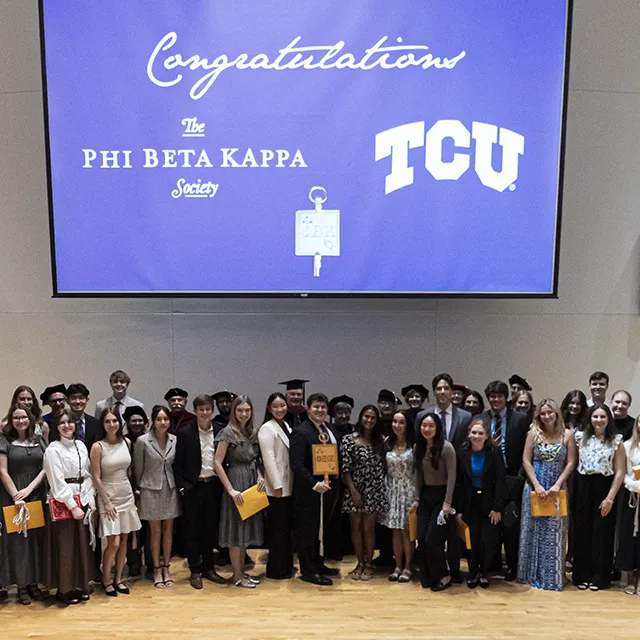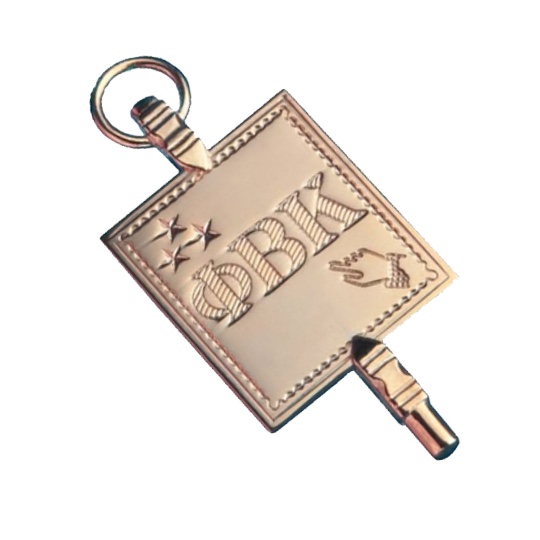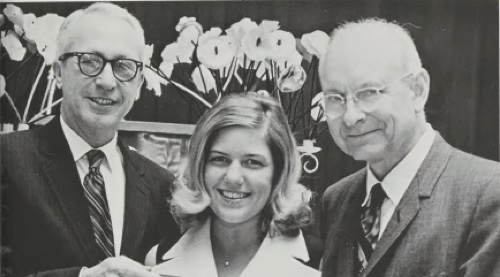Phi Beta Kappa at TCU
For fifty years, TCU has been among the elite 10 percent of American universities that meet the rigorous academic standards required to have a Phi Beta Kappa chapter.

Founded in 1776, Phi Beta Kappa is the nation’s oldest and most prestigious academic honor society. Its motto, “love of learning is the guide of life,” perfectly expresses TCU’s commitment to a quality liberal arts education and dedication to a lifetime of enquiry. In 1971 our chapter— Delta of Texas — became the fourth chapter granted in the state.

Phi Beta Kappa’s legacy includes 17 U.S. presidents, 42 Supreme Court justices and more than 150 Nobel laureates. Membership in Phi Beta Kappa is a distinction highly regarded by employers, and key holders are presented with opportunities for networking as well as lifelong intellectual and civic engagement.
To be considered, students must have excellent grades in studies showing a breadth of knowledge in the liberal arts. Most initiates are juniors and seniors, and graduate students are sometimes invited.
Initiates are recognized each April at Honors Convocation, and each year one Phi Beta Kappa Senior Scholar is announced at the Honors Banquet.
We are extremely proud of TCU’s affiliation with Phi Beta Kappa and the achievements of our initiates.
Eligibility for election to membership in course shall be contingent upon fulfillment of the following minimum requirements. Chapters are expected to determine the specific application of standards stated in these Stipulations.
- Eligible students shall be candidates for a bachelor’s degree in a College of Arts and Sciences or its institutional equivalent.
- They shall be majoring in an area of the liberal arts or sciences. If departments of economics, music, political science, or other subjects normally offered in a College of Arts and Sciences are classified in another division of the institution, students majoring in these subjects may be considered if they are candidates for a bachelor’s degree in a College of Arts and Sciences.
- They shall include not less than 90 semester hours (or the equivalent) of liberal arts work among the 120 hours ordinarily required for the degree, exclusive of required courses in physical education and any military science.
- Students electing a combined curriculum in such fields as law, medicine, dentistry, or engineering may be considered if they take at least 90 semester hours or the equivalent of liberal arts work in a College of Arts and Sciences, complete at least half of the requirements for a liberal arts major, and meet all of the other requirements defined in these Stipulations.
- Grades earned in applied or professional work shall not be counted in computing the grade-point average for purposes of eligibility. Applied and professional work shall be understood to include those courses intended primarily to develop skills or vocational techniques in such fields as business administration, education, engineering, home economics, journalism, library science, military science, physical education, communications, secretarial studies, speech, and applied art and music.
- Weight shall be given to the breadth and proportion of the program of each candidate as shown by the number and variety of courses taken outside the major.
- Candidates shall have demonstrated, by successful work in high school or college, or in the two together, a knowledge of mathematics and of a foreign language at least minimally appropriate for a liberal education. In no case shall this mean less than the completion of the intermediate college level in a foreign language, or its equivalent, and the equivalent of two years of college preparatory secondary school mathematics. Either requirement may be met by a proficiency test.
The Stipulations Concerning Eligibility for Membership in Course were adopted by the Phi Beta Kappa Council in 1952. Chapters founded since 1952 are required, and others are requested, to observe the Stipulations, which, as printed above, incorporate revisions made by the Twenty-Ninth Council in September 1970, and amendments adopted by written vote of the chapters in July 1991.
NOTE: The above requirements stipulate the minimum requirements to be considered for election. Each chapter is allowed to induct only 10% of the number of the preceding year’s graduates who earned degrees in the liberal arts and sciences. Members of the TCU chapter meet to examine the transcripts of persons meeting the minimum requirements to elect the best of those candidates to fill the available induction spaces. Not all students who meet the minimum requirements are elected to membership.
The TCU Chapter of Phi Beta Kappa, Delta of Texas, consists of all faculty and staff on campus who have been elected to PBK, no matter where or when. If you are a member of PBK and are not on this list, please contact Carrie Currier.
Officers
President
Carrie Currier, Political Science
Vice President
Samuel Arnold, Political Science
Secretary
Ze-Li Dou, Mathematics
Treasurer
Rob Garnett, Economics
Historian
David Moessner, Religion
Members
Samuel Arnold, Political Science
Sara Arnold, University Advancement
William Baird, Brite Divinity School, Emeritus
Victor A. Belfi, Mathematics, Emeritus
Colby Birdsell, John V. Roach Honors College
Bonnie Blackwell, English
Cathy D. C. Block, Education, Emerita
Eugene Boring, Brite Divinity School, Emeritus
Joseph Butler, School of Music
Jodi Campbell, History
Natalya Cherry, Brite Divinity School
Michelle Clark, University Advancement
David Colón, English
Carrie Currier, Political Science
Michael Dodson, Political Science
Nowell Donovan, Geology, Provost to the University, Emeritus
Robert Doran, Mathematics, Emeritus
Ze-Li Dou, Mathematics
James Duke, Brite Divinity School
Patricia Duncan, Religion
Pearce Edwards, Political Science
Homer Erekson, Neeley School of Business, Emeritus
Anne Frey, English
Greg Friedman, Mathematics
Robert Garnett, Economics
Theresa Gaul, English
Daniel Gil, English
George Gilbert, Mathematics
Rebecca Glass, Technology Resources
Justine Grace, Honors College
David Grant, Religion, Emeritus
John Harvey, Economics
Rhonda Hatcher, Mathematics
Jill Havens, English
Andrea Heitz, University Advancement
Jack Hill, Religion, Emeritus
Sarah Hill, Psychology
John Horner, Biology
Linda Hughes, English
Benjamin Ireland, Modern Languages
Maureen Kenney, Neeley School of Business
Roby Key, University Advancement
David Kinch, Technology Resources
Ted Klein, Philosophy, Emeritus
Kevin Knight, Institute of Behavioral Research
Michael Kruger, Dean, College of Science & Engineering
Nadia Lahutsky, Religion, Emerita
Susan Layne, Center for International Studies
William Meier, History
David Moessner, Religion
Mary Morton, Harris College of Nursing & Health Sciences
Megan Murphey-Jones, University Marketing
Lauren Nixon, Office of the Chancellor
Andie Piehl, College of Fine Arts (retired)
Catherine Elizabeth Plummer, Neeley School of Business
C.A. Quarles, Physics, Emeritus
Stephen Quinn, Economics
Nancy J. Ramsay, Brite Divinity, Emerita
Evelyn Richardson, Financial Services
Ken Richardson, Mathematics
Luis Romero, Comparative Race & Ethnic Studies
Sam Ross, Religion
D. Mike Sacken, Education (retired)
Melissa Schroeder, Communication Studies
Rebecca Sharpless, History
Emmett Smith, Music, Emeritus
Karen Steele, English
Michael Strausz, Political Science
Mark Thistlethwaite, Art History, Emeritus
Drew Tomlin, Mathematics
Robert Vigeland, Accounting, Emeritus
Spencer Wertz, Philosophy, Emeritus
Tracy Rundstrom Williams, John V. Roach Honors College
The Delta of Texas chapter remembers and honors our members who have passed away.
In Memoriam:
Paul Boller, History, Emeritus
Don Coerver, History
Arthur Ehlmann, Geology, Emeritus
Bob Frye, English, Emeritus
Donald Jackson, Political Science, Emeritus
Peter Locke, Finance
Robert Neilson, Chemistry
Frank Reuter, History, Emeritus
David Vanderwerken, English
Spring 2025 initiation will be held Thursday, May 8, at 2:00 pm in the BLUU auditorium.
Each year, TCU’s Delta of Texas selects one Phi Beta Kappa student to be the James W. Newcomer Senior Scholar. This award is named for Dr. James W. Newcomer, who was one of the founding members of TCU’s chapter in 1971 and was instrumental in shaping its development over the following decades.
We are pleased to recognize his contributions by giving this award to the Phi Beta Kappa candidate who best exemplifies the ideals of Phi Beta Kappa as expressed in its motto “Love of learning is the guide of life.”
Previous Newcomer Senior Scholars include:
2025: Dominic Mendlik
2024: Isabella Marrin
2023: Amelia Boatwright
2022: Emily Jackson
2021: Ashley Nicole Parks and Audrey Cosette Payne
2020: Laska Anderson
2019: Andreley Bjelland
2018: Kendra Larach
2017: Malcolm Baker
2016: Kelcie Willis
Based in Washington, DC, the Phi Beta Kappa Society offers a variety of programs that champion education in the liberal arts and sciences and foster freedom of thought:
- National Arts & Sciences Initiative
- Visiting Scholar Program
- Awards and fellowships
- Key Connections networking events
- Alumni associations
- Publications
- Podcasts
- Digital book club
A Key Legacy

In July 1946, TCU’s president, Dr. M. E. Sadler, inquired about applying for a Phi Beta Kappa chapter, and in 1949 a formal application was submitted. TCU applied every three years until the national PBK committee made its first visit to campus in the 1960s. TCU was granted a charter in September 1970 and the Delta of Texas chapter was installed on February 24, 1971.
Valerie Neal ’71 was TCU’s first Phi Beta Kappa award recipient that year. Valerie went on to enjoy a remarkable career with Smithsonian’s Air & Space Museum and returned to TCU as a guest speaker at Honors Convocation in 2013. She is shown here with Dr. Sadler (right) and James Newcomer (left), Vice Chancellor for Academic Affairs and one of the founders of Phi Beta Kappa at TCU.